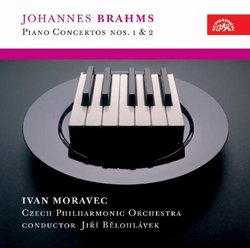| All Artists: Johannes Brahms, Jiri Belohlavek, Czech Philharmonic Orchestra, Ivan Moravec Title: Brahms: Piano Concertos Nos. 1 & 2 Members Wishing: 0 Total Copies: 0 Label: Supraphon Original Release Date: 1/1/2006 Re-Release Date: 2/28/2006 Album Type: Import Genre: Classical Styles: Chamber Music, Forms & Genres, Concertos, Historical Periods, Classical (c.1770-1830), Instruments, Keyboard Number of Discs: 2 SwapaCD Credits: 2 UPCs: 099925386528, 009992538652 |
Search - Johannes Brahms, Jiri Belohlavek, Czech Philharmonic Orchestra :: Brahms: Piano Concertos Nos. 1 & 2
 | Johannes Brahms, Jiri Belohlavek, Czech Philharmonic Orchestra Brahms: Piano Concertos Nos. 1 & 2 Genre: Classical |
Larger Image |
CD Details |
CD Reviews(Not) only for Moravec fans! SwissDave | Switzerland | 04/06/2006 (4 out of 5 stars) "The prize here is the recording of the 2nd Concerto, which is imaginatively played and beautifully accompanied. Pianophiles will be as interested in Moravec's interpretation of the 1st Concerto, who gives a poetic interpretation of the piano part, but the performance as a whole unfortunately suffers from the same problem as Moravec's latest recording of Beethoven's 4th (versus the perfectly accompanied Franck and Ravel on the same CD) with Belohlavek, also on Supraphon: chef and orchestra seem uninspired already in the orchestral introductions, then appear to merely follow the soloist rather than interact with him, as if intimidated by his superiority. Sound quality has less natural bloom in No. 1, although both suffer from lesser resolution in the highs, usually more typical of early than late eighties digital (these are DDD recordings from 1988/89). Paradoxically, in the recording of No. 1, the piano sounds less bass-shy than the orchestra, although balance problems alone cannot account for the fact that, for example, right from the start, the drums in the introduction can barely be heard (and so on, until one adjusts and keeps listening only to the impressive piano playing). My desert island choice for No. 1 remains Fleisher/Szell, although, if as I do you like listening to alternative versions to keep your mind and appreciation of a composition afresh, I recommend Solomon/Kubelik, Curzon/Szell, Rubinstein/Leinsdorf, Rubinstein/Reiner and Serkin/Szell. Another reason I like Moravec's interpretation of the 2nd Concerto better, apart from the rather successful, more organic orchestral accompaniment, is that here one finds more of the pianist's idiosyncratic (though never outrageous or unjustified) touches. If there is another modern (from the digital era) recording of No. 2 as individual, tasteful and memorable as this, I haven't heard it, and the sound quality is more than acceptable, though again not of reference quality. Here too, my desert island choice remains Fleisher/Szell (making that double CD an obvious first choice, the more so as it includes reference fillers), with Solomon/Dobrowen, Rubinstein/Krips, Anda/Karajan and, last but not least, Moravec/Belohlavek favourite versions for alternative listening, to somewhat lesser extent also Gilels/Jochum and Backhaus/Böhm. In a nutshell: get this for No. 2, and since you get both at mid price, think of No.1 as an attractive bonus! Greetings from Switzerland, David." A more lyrical, understated style with many personal touches Santa Fe Listener | Santa Fe, NM USA | 12/26/2008 (5 out of 5 stars) "In both of his piano concertos Brahms begs for a heroic contest between piano and orchestra, each part written on a vast scale. What makes Moravec's version of Concerto #2 from 1988 so refreshing is that he refuses to approach the music as struggle, and wconductor Jirí Belohlávek is in accord stylistically -- their attacks are soft-grained compared to, say, Fleisher/Szell, Gilels/Reiner, Richter/Leinsdorf, and Serkin with either Szell or Ormandy.
Those famous accounts defined the Brahms Second for decades, but Moravec joins Emanuel Ax, in his Sony recording with the Boston Sym. under Haitink, in trying to play against the grain -- in both cases there are lovely impressionistic touches. But the prize goes to Moravec for his personal use of rubato and unexpected inflections with the melodic line. I haven't been a fan of his Chopin, but here the off-kilter quality feels fresh and engaging. The Czech Phil. plays beautifully, without a hint of routine, and Belohlávek is alert and convincing. (The special relaxed, expressive tone of the string playing is perfectly embodied in the cello solo that opens the slow movement -- I've never heard a more charming version.) The recorded sound is good, but the piano's top octave is fairly glassy at loud volume. The previous reviewer hears a considerable falling off with the Concerto #1 from 1989, and I must admit that the long orchestral tutti that begins the work is very understated, with barely discernible timpani in the background. I'm not sure, however, that this is a failing. Every other Brahms First is freighted with heroic rhetoric, so to my ears Moravec/Belohlávek are continuing in the same vein as in the Second. After a few bars, the charm of the Czech Phil's playing, combinedw with a quicker than usual tempo, made the music feel unusually lively as opposed to supercharged. Moravec's style is similar in both works, but I wish he weren't quite so laid back in the last two movements -- the Adagio verges on meandering. If I were a technician, no doubt I'd find flaws in his double trills and other exacting passages, but for lyricism and relaxed expression, Moravec seems quite ideal. To my surprise, I came through this set with heightened regard for both pianist and conductor. Their version of the Second, and maybe even the First, belong among the stellar ones from the past." |
